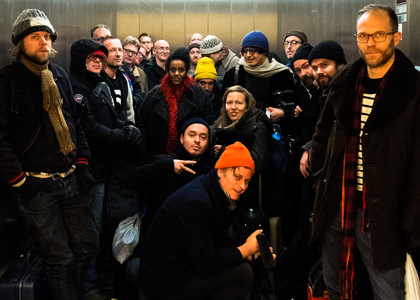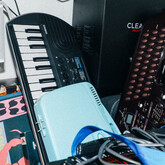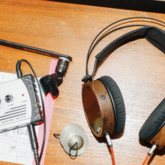
In their own words, improvisation trio Fire! suffered a little hubris and, suddenly, Fire! Orchestra was conceived. This 28-member ensemble challenges the gods and genre categorization with its multifaceted music. This summer, the ensemble will play its first major rock festival, Denmark's Roskilde.
Everyone in Södermalm [Stockholm's Soho, Ed.] looks like a bassist. Or maybe it's pure coincidence that three men with shaved heads are in the coffee shop where we've agreed to meet. I manage to introduce myself, albeit tentatively, to two of these possible bassists before Johan Berthling – the bassist in Fire! – saunters into the Skåningen coffee shop in Nytorget.
Improvisation trio Fire! comprises the core of Fire! Orchestra and includes, aside from Johan, Mats Gustafsson on saxophone and electronics and Andreas Werliin on drums.
The plan was to meet the entire trio in Stockholm, but the members' jam-packed schedules and overseas trips essentially made this impossible. The three won't meet again until their next gig, which is in Bergen, Norway.
"We're all interested in different types of music and involved in many other projects. This is what enables the band to work so well. We bring those experiences to the table when we play together," Johan explains.
Today, the world is Fire!'s oyster and the trio is more likely to play in Japan or Eastern Europe than Sweden. But it was right here, in the Nytorget neighborhood, that it all began − and here the band's roots remain.
"On the way here, I met Conny Lindström [concert promoter and Stockholm celebrity, Ed.], and it was originally his idea that the three of us should play together. At the time, he was part-owner of Ugglan night club, which is just around the corner. It was a real melting pot for people and music. A true alternative music mecca."
Conny arranged a gig for the trio in LillaBaren, the music stage at Stockholm restaurant Riche. Johan had previously played with the other two separately in different contexts, while Mats and Andreas didn't even know each other. Despite this, the band members melded immediately.
"Before our first gig, everything just fell into place. We produced a monotone sound, not quite free jazz, even if it was veering that way."
According to the official mythology on the band's website, the bar staff at Riche had to hold the glasses in place for fear they would shatter from the volume at that first gig.
"Later that week, we went into the studio and recorded our first album."
How do you record an improvised album? Do you just sit and jam for an hour?
"We're pretty good at realizing our ideas. None of us was interested in making an album of solely free jazz and improvisation. We most often start with a groove – bass and drums – and then add a riff idea and a structure."
The result was the debut album You Liked Me Five Minutes Ago, which was released on Norwegian label Rune Grammofon in 2009. Since then, things have just rolled along, as Johan puts it. Fire! has recorded seven albums and toured a couple of times a year.
The trio is sticking with improvised music, although over the years the band has developed a characteristic style. If you attend a few Fire! gigs, you'll start to recognize several elements.
"Sometimes we agree to start with a particular riff, but most often not. We have a catalog of ideas we've played and tested, and they often crop up in no particular order. Things turn out best when we decide as little as possible in advance."
Having a body of material to fall back on provides the band with a sense of security on stage.
"If one of us indicates that we should play – or stop playing – in a particular way, everyone understands and moves toward or away from it. That's the appeal. And having a frame of reference means that we seldom sound like we're searching; that's what makes us sound like we do, and not like just any other run-of-the-mill improvisation band."
"It shouldn't feel too safe. With common ground, you can push the limits, and I think that's more interesting than ad hoc jamming. Otherwise you tend to stand doing your cool thing next to someone else doing their cool thing."
How do things work on stage? Do you talk to each other or does someone act as conductor?
"No, we don't talk to each other on stage – that would be terrible. We've played together so much that we can produce good music without saying anything. We've reached a level where we can best express ourselves via our instruments; so all three of us are conductors."
"When we play with Fire! Orchestra, Mats acts as conductor. In part because he's so good at physically expressing how people should play and when they should come in, and in part because we were forced to have a conductor to get some kind of grip on 28 musicians."
The Fire! Orchestra idea was conceived one evening after a Fire! gig. The idea was to take Fire!'s music and to expand and extend it by adding more instruments and even vocals.
"Of course, there's a small element of hubris to this, but it's fun. In the Swedish music world, you're not really supposed to suffer hubris. When we first discussed the project, I suggested that we should have ten musicians, but someone upped the ante and finally we settled for about 30 musicians."
Just as with Fire!, the idea was that Fire! Orchestra would be a one-time thing. Andreas, Mats, and Johan went through their phone books and managed to find 28 musicians aged 20–70 years who could play at the now somewhat legendary concert at the Fylkingen music venue in Stockholm in January 2012. The Orchestra rehearsed for the first time the day of the concert, which was recorded and later released as the album Exit!
"It was something of a success in our little world. The album received very good reviews, especially outside Sweden."
After this success, they realized they were on to something with Fire! Orchestra and booked a new gig with the orchestra for the following year.
"We discovered that January is the perfect month to play with Fire! Orchestra. Almost all musicians are available as there are no other gigs."
This past January, they toured Scandinavia and then recorded a new album, which will be released later this year.
Fire! Orchestra has taken several forms since 2012, but many of the musicians from the original ensemble remain. Aside from a large brass section with about a dozen musicians, including well-known trumpet player Goran Kajfes, the orchestra includes three guitarists, three drummers, two keyboardists (one of which is Martin Hederos from The Soundtrack of Our Lives), and someone to take care of the electronics.
"Seeing us live is a real experience. It's not just a case of the amplifier being turned up to the max and playing – there's the acoustic pressure of standing before 30 musicians giving it their all."
Unlike Fire!, Fire! Orchestra features three vocalists, under the direction of Mariam Wallentin, who also writes the lyrics.
"Mariam, Sofia, and Simon – the singer from Silverbullit [known as Citizen Bird in the US, Ed.] – are incredibly important. They soon began collaborating almost telepathically. There are some pretty long instrumental sections, but they follow the music and remain focused, which isn't always easy."
Another major difference between the trio and the orchestra is that the latter has a clearer structure. The music is jointly-composed by Mats, Andreas, and Johan, although it's still largely improvised.
"Without the musicians in the orchestra, it just wouldn't sound the same. Everyone contributes with improvisation and the ability to play the same thing for long periods. Not everyone has the desire or even the ability to do that. It's exciting to listen to people who play very well resigning themselves to playing something simple and monotonous."
Johan describes with a passion his thoughts on musical improvisation, having musical frames of reference, and not being limited by technology but rather finding one's own musical toolbox.
"I think it's important not to feel restricted. You acquire the technology you need for that which you want to express. It often involves not worrying about what others do. Good musical improvisation creates a dialog that continually begs the question: what kind of music is this?"
Doesn't this demand a great deal from the listener?
"Good music always demands something from the listener. But if you pass that hurdle, you open the way to something fantastic. And I think you can hear that from the audience after a gig. First there's dead silence, then wow!"
This summer, you're playing Roskilde Festival. This is the first time you're playing a major rock festival. How does that feel?
"It'll be fun, but also a little nerve-racking. We're used to having a few hours for our sound check – at Roskilde we'll only have time to check that everything is plugged in."
Are you worried the audience won't get it?
"No, every time we've played and things haven't felt spot on initially, we've managed to win the audience over in the end, so I'm not at all worried about that. Also, as a festival, Roskilde has a reputation for staging new and interesting acts. It's not quite like playing a small town festival in Sweden."
How does Fire! Orchestra differ from a regular orchestra?
"We have very strong individualists in the band. Any of our members can cut in at any time. This enables everyone to alter the piece. You get a highly-charged atmosphere with 28 soloists on stage – and Mats can choose any of us to play a long solo. It keeps you on your toes."
With 28 musicians and two sound engineers, is the pay for a gig enough?
"No, it's not. We're completely dependent on national grants to take this project outside Sweden – although we received no such support in 2012 and 2013. We receive grants from the Swedish Arts Council and Music Development and Heritage Sweden, but those funds have already almost dried up. Doing this is costly, but it also feels like a very important endeavor. We make the impossible possible."
Text: Andreas Löf
Photo: Micke Keysendal
Five improvised songs you like?
JOHAN:
Chris McGregor's Brotherhood of Breath – Chris McGregor's Brotherhood of Breath
NunoCanavarro – PluxQuba
Talk Talk – Laughing Stock
Arthur Verocai – Arthur Verocai
Miles Davis – Get Up With It
MATS:
The Cramps – Surfin' Bird
Helmut Lachenmann – Gran Torso
The Stooges – Dirt
The EX – State of Shock
GyörgyLigeti – PoèmeSymphonique
How to receive STIM royalties for improvised music
In order to receive royalties for improvised music, register the work with STIM after its performance. If the work has no name, then name it, such as Improvisation XXX. It is then treated just like any other work. Fire! splits its income equally for strictly improvised music.
"In my view, you share everything equally if you've sat in the same room and made the music together," says Johan
Berthling.
"Fire! Orchestra's music is not freely improvised music, but rather structured improvisation, often with graphic scores."


